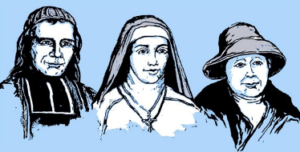William Joseph Chaminade was born on April 8, 1761, in Périgueux, France. The French Revolution profoundly shaped the course of Fr. Chaminade’s life path. Fr. Chaminade adopted a dangerous, anti-government stance; he refused to pledge allegiance to the government instead of the Roman Catholic Church.
In the early years of the revolution, Fr. Chaminade was able to continue a clandestine ministry in Bordeaux, sometimes disguising himself as a tradesman so that he could take the sacraments to his flock.
In 1797, in fear for his life, Chaminade was driven into exile in Saragossa, Spain. During this time in exile, Chaminade conceived of a plan that would sculpt the rest of his life.
Fr. Chaminade returned to France and joined forces with Adèle de Batz de Trenquelléon and Marie Thérèse de Lamourous, two women both committed to the “mission of Mary.” In 1816, with support from Chaminade, Adèle founded the Daughters of Mary Immaculate, commonly known as the Marianist sisters. Just a year later, a group of male sodalists came to Chaminade with the goal of forming a religious institute under his direction. On October 2, 1817, these faithful men formed the Society of Mary.
The Marianist charism emphasizes community, inclusivity, faith, and service to the poor and to youth. Members of the Marianist Family (sisters, brothers, priests and laypersons) seek to continue the Blessed Mother’s mission of bringing Christ to the world.
Education has always been a key element of the Marianist mission. A Marianist school:
- Educates for formation in faith
- Provides an integral, quality education
- Educates in family spirit
- Educates for service, justice, peace and the integrity of creation
- Educates for adaptation and change


